Where once stood the Night’s Watch fortification of Eastwatch-By-The-Sea, there now remains a huge, gaping hole in the ancient Wall that separates the North (the kingdom) from the North (the direction.) The closing moments of the seventh season of Game of Thrones featured an army of the dead pouring through that gap, a vast undead horde of wights led by the supernatural White Walkers and their dragon-mounted commander, the Night King.
The White Walkers had existed as an existential threat to the Seven Kingdoms throughout the series, ever since a Night’s Watch ranging party were ambushed in the first fifteen minutes of the premiere episode. Although the television show appeared to be a grounded nearly-historical medieval political drama, the occasional reminders of a growing threat north of the Wall served to remind viewers that, although the show was called Game of Thrones, the book series is more properly A Song of Ice and Fire. The White Walkers, like that one party guest with no imagination, would be bringing the ice.
Daenerys Targaryen, of course, brought along fire in the form of her dragons, and we understood her motivations from the gaming and throning context as well. She wanted the Iron Throne because it once belonged to her family. Her father had been deposed, her family had been killed during the usurpation, and she and her brother Viserys had lived for years in desperate exile as a result. Daenerys intended to put House Targaryen back on top, and maybe enact some social change, since she’d have the power and security to do so.
Some of Dany’s motivations seem a bit contradictory: she wants to break “the wheel” but she’s also trying to be the one on top of it. Maybe? It makes for good drama though, to have protagonists with complicated drives.
We have something a bit different with the White Walkers. We can only guess at their motivations, and I feel people are always trying to add some kind of complexity to them. The surface impressions seem rather straightforward.
Night King: Yeah, we mostly don’t like living people.
Me: Really?
Night King: Yup. We like to kill people, then either one of my lieutenants or I will raise the dead up into being a wight, and they work for us.
Me: Any exceptions?
Night King: Well, we had an arrangement with the wildling Craster. He donated his sons to the cause. He was a godly man.
Me: This brings up so many questions. Was Craster the only one doing this? Why only sons? Has this been going on for thousands of years?
Night King: Hmmm. That would be telling.
Me: So, no comment?
Night King: No comment. You’ve seen the show, I’m a monster of few (like, zero) words.
Through the course of the series, we’ve seen this hatred of living, breathing humanity playing out. Wildlings ambushed, butchered, and raised. Black Brothers a-ranging north ambushed, butchered, and raised. The threat was so bad, the entire wildling population of beyond-the-Wall set aside their differences to band together for protection. Mance Rayder turned a loose collection of warring, feuding families (with cannibals and moon worshippers, etc.) and turned them into one focused refugee army heading south.
This group of wildlings was apparently too large to effectively be confronted in force. The White Walkers were seemingly comfortable dealing with small groups, or even the hundreds of Night’s Watchmen at the Fist of the First Men, but it wasn’t until Mance’s forces were scattered by Stannis Baratheon’s troops did the White Walkers make their move against the Free Folk in earnest, attacking what remained of Mance’s refugee forces at Hardhome.
After Hardhome, it seemed like a reasonable assumption that any wildling north of the Wall was either a wight or soon-to-be one. And now that the White Walkers are no longer trapped north of the Wall, they can continue their activities in the southern lands.
Jon Snow: Technically, my kingdom isn’t “southern lands” – we do have “the North” in the official kingdom name.
Me: Don’t get too comfortable with names, Aegon.
Jon Snow: What?
Me: I said, “don’t get too comfortable with names, eh Jon?”
Jon Snow: I don’t get it.
Daenerys: Oh, he can get it.
To get back on track… now the White Walkers are free to continue their ruthless policies against the living in the lands that they were previously locked out of. But just why are they doing this? Is the Night King interested in the Iron Throne? Or do they just not like living people?
Night King: What part of “we don’t like living people” needs further explanation?
There probably isn’t some deeper purpose than that.
According to our interpretation from Bran’s visions in Season Six, and his discussion with child-of-the-forest Leaf, the Night King was created as a weapon to be used against humanity. We don’t know if the Children made the Night King’s first lieutenants similarly, or if he figured out that trick himself, but we can gather that this weapon became a threat not only to the First Men in Westeros, but also to the Children of the Forest, who later made a mutual-defense pact with humanity and helped build the Wall.
If the Night King and his kind were created to be weapons against humanity, then the motivation of fulfilling their purpose seems sufficient to explain their behavior. They couldn’t kill the people of the Seven Kingdoms before, but now they can.
But is this satisfactory, from a story perspective? Over the years (because we’ve had years and years thanks to the extended times between book releases) much has been made of the author George R.R. Martin subverting the tropes of conventional fantasy. That the big damn hero might die unexpectedly. That a rescue might not be forthcoming. That we’d be rooting for villains we started off hating.
The idea that the final phase of Game of Thrones will boil down to good guys versus bad guys, with the bad guys being the White Walkers since they’re simply evil – or at least inherently inimical – it just seems not really a subverting of any trope. Couldn’t there be more complexity to the White Walkers? Wouldn’t it be a twist if the White Walkers were the good guys?
Actually, that seems rather dumb.
Regardless the hypothetical justifications that the White Walkers might possibly suggest at some point, murdering people and desecrating their corpses by raising them up as killing machines is probably never going to be considered a positive factor if we’re labeling one side of a conflict as the “good guys.”
And I’m not so sure that it’s narratively a problem either if the White Walkers are exactly as advertised: a dangerous force that is almost entirely motivated by an urge to wipe out the living. It’s a situation that I have enjoyed reading about before.
Back in 1963, Fred Saberhagen published his first short stories featuring the Berserkers, a robotic race built as a doomsday weapon. The berserkers eliminated the race that their creators were warring with, and along the lines of inevitable dramatic irony, eliminated their creators as well. We don’t necessarily know exactly why they treated their creators in this fashion, but that is why berserkers are called doomsday weapons.
These self-replicating somewhat-sentient murderous automatons had very simply directives.
Berserker: We hate life. Life is the enemy.
Me: Any exceptions?
Berseker: Well, to be fair, we sometimes allow a living being to become “goodlife” – we can make an expection for goodlife.
Me: Oh, this is interesting! And what constitutes being goodlife?
Berserker: Being willing to help the berserkers kill off all the other “badlife” – those living creatures that don’t agree with our anti-life agenda.
Craster: Sign me up! I be a goodlifey man!
Although the berserkers did not possess complicated or mysterious motivations, that’s not to say that Saberhagen’s stories were simple and unengaging. One might say that the two sides in a conflict described short stories, novellas, and full novels were merely good guys versus bad guys – Humanity versus Berserkers, but that wasn’t the case. Humanity was a mess. There were factions, people with contradictory ideas on how to proceed in the war against the berserkers, people trying to gain some advantage over others thanks to the chaos and confusion of interstellar war with relentless robots. It wasn’t a simple situation.
The berserkers themselves, although a monolitic race of impersonal machines, developed their own odd quirks in reaction to losses when facing determined humans. They’d make mistakes, underestimating human behavior. They began to fear certain individuals, which led to interesting consequences. These touches turned the berserker stories from being good science fiction to great science fiction.
That situation seems entirely analogous to the White Walkers now coming south into the Seven Kingdoms. They are a unified force, with a clear agenda. Their opposition, everyone living south of the Wall, can hardly make that claim.
The people in power in the south have all kinds of issues, politically and personally. There are at least three factions, the Stark-held North, the Targaryens, and the Lannisters. We’re seeing a nascent Stark-Targaryen alliance in play, but anti-Targaryen sentiment in the Starks’s coalitions are bound to flare up when Jon Snow’s true parentage becomes known. Cersei Lannister is planning her double cross on, well, the rest of humanity, but she’s just lost her right hand man (with no right hand) and her reliance on Euron Greyjoy might be short sighted.
(Did Cersei actually give Euron a ton of gold and sent him off to buy an army? Had she considered that the army he buys might not consider her the employer in this contractual arrangement?)
So there’s plenty of dramatic tension to explore among the living. It’s kind of unfair to insist on the dead to be having issues as well.
Season Eight will definitely not be everyone suddenly setting aside their differences and teaming up against a common enemy in a battle of the unified living versus the unified dead. For one, that would be kind of too simple for Game of Thrones.
And secondly, it would break the rule of people refusing to follow Ned Stark’s sage advice, when going against it leads to eventual disaster.
- Cersei probably should have taken the opportunity Ned offered her, to take the kids and some bags of gold and get out of King’s Landing when the getting was good. Maybe her kids wouldn’t be dead.
Cersei: Please. I can make more kids. Jaime and I are the most fertile couple in Westeros.
Dany: There’s no need to go bragging about it.
- Renly probably should have followed Ned’s lead and supported his brother Stannis (and Ned as well.) Being Prince Renly Baratheon is better than being a corpse.
Renly: But Loras really wanted me to be king!
Loras: Just call me the Kinglayer.
Margaery: Groan.
Wait. Was I implying Ned was running around warning people to unite against the White Walkers?
Will the Deserter: If so, he needs to give me credit and apologize for beheading me!
Gilly: That’s almost as bad as Sam stealing my thunder for discovering Prince Ragger’s annulment – whatever that was.
I’m just saying that Ned had a very appropriate saying that can apply to the current situation.
When the snows fall and the white winds blow, the lone wolf dies, but the pack survives. Summer is the time for squabbles. In winter, we must protect one another, keep each other warm, share our strengths.
Winter has come, and the measure of the men and women still alive will be taken by how quickly they can set aside their need for squabbling, and to share their strengths.
I’ve heard it theorized that the White Walker threat might be dealt with very early in Season Eight, as another subversion of the trope. “Oh, you thought the White Walkers were a big deal? Surprise” – and then we’d have episodes and episodes of people trying to decide who gets the uncomfortable chair.
I really don’t think so. Even with people putting aside their differences and squabbles to unite by choice or by necessity against Winter itself, there’s room for drama, jockeying for position, and being readying to rule the living once the dead are truly dead.
After all, the White Walkers have been waiting a long time to get in on this Game of Thrones action. It would be a shame just to hand wave them away too quickly. The people down south deserve some time to react to them, to see who is in it for everyone, and who is only in it for themselves.
Night King: Hey man, we’re just trying to get away from the snarks and grumkins. We’re bad guys, we hate life, man – hate it, but these guys are the worst.
Snark: CAN I INTEREST YOU IN MY ‘BRAN STARK IS THE NIGHT KING’ THEORY?
Night King: NO!
Grumkin: I CAN’T ACCEPT THAT THE WALL WAS BROUGHT DOWN WITHOUT USING THE HORN OF JORAMUN! SHAME! SHAME!
Night King: Look I can’t take much more of that. The sooner Arya Stark cuts my head off with that Valyrian steel dagger, the better.
Me: Fine. But not until Episode Six, the finale.
Night King: Fine. It’s a deal.
The post The White Walkers: Whys, Whats, and Other Thoughts on the Endgame appeared first on Watchers on the Wall.
Via http://watchersonthewall.com
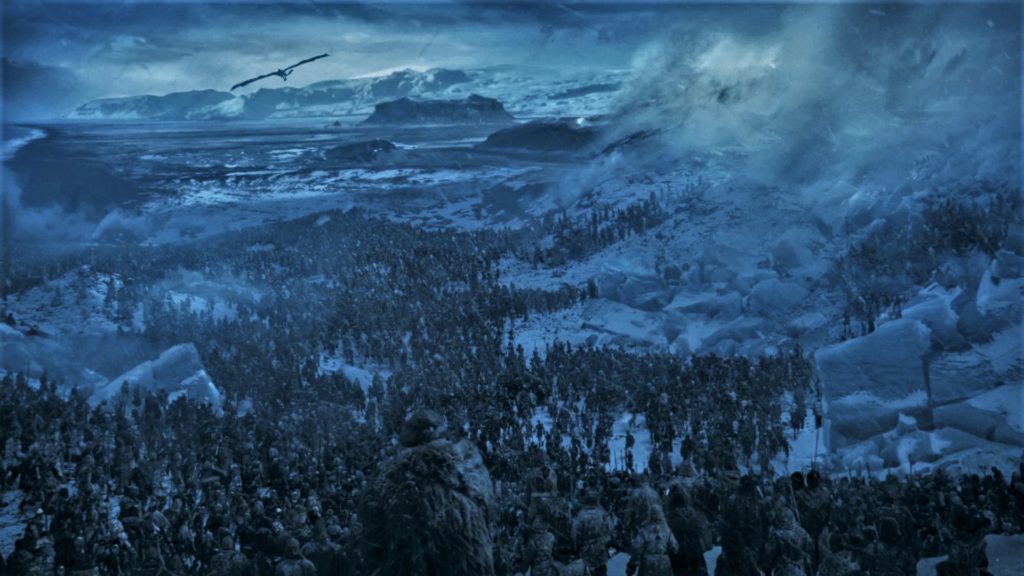
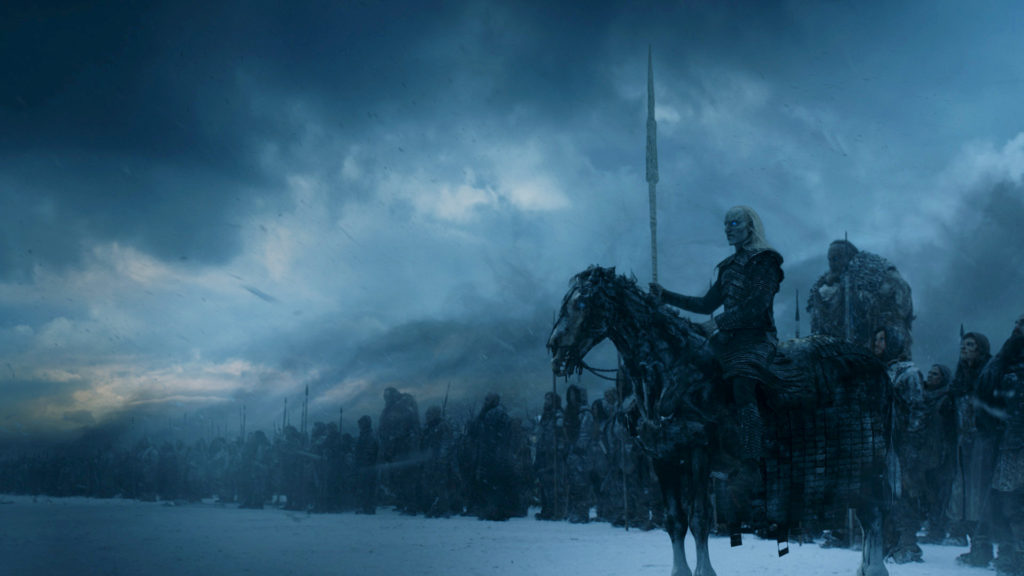
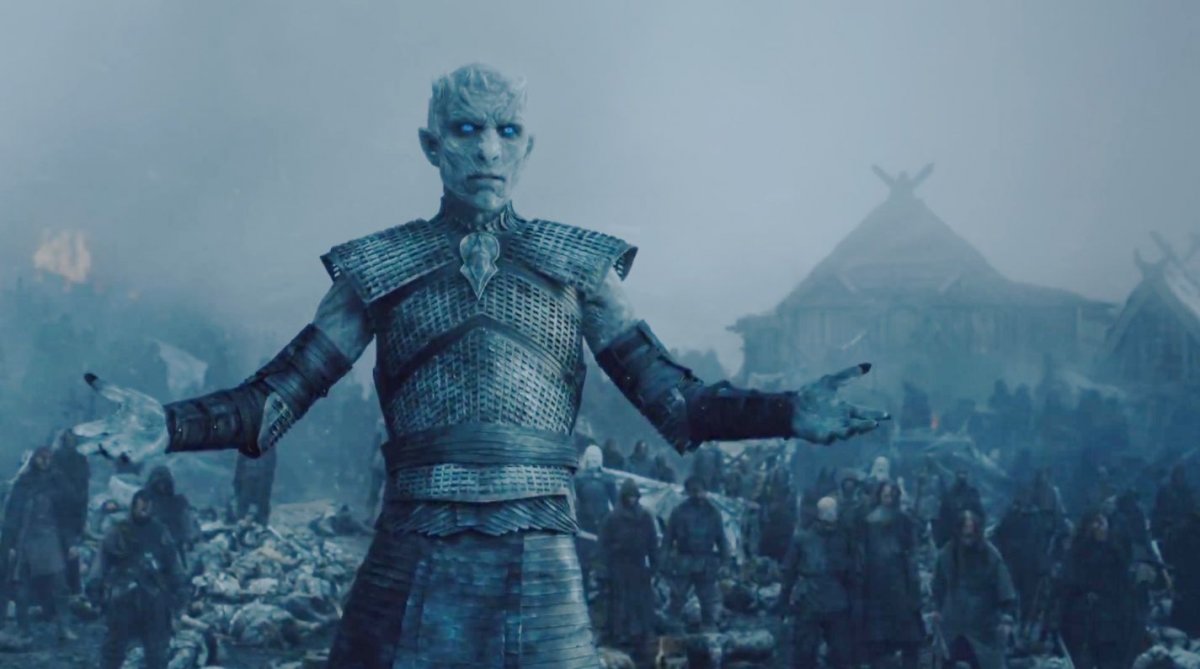

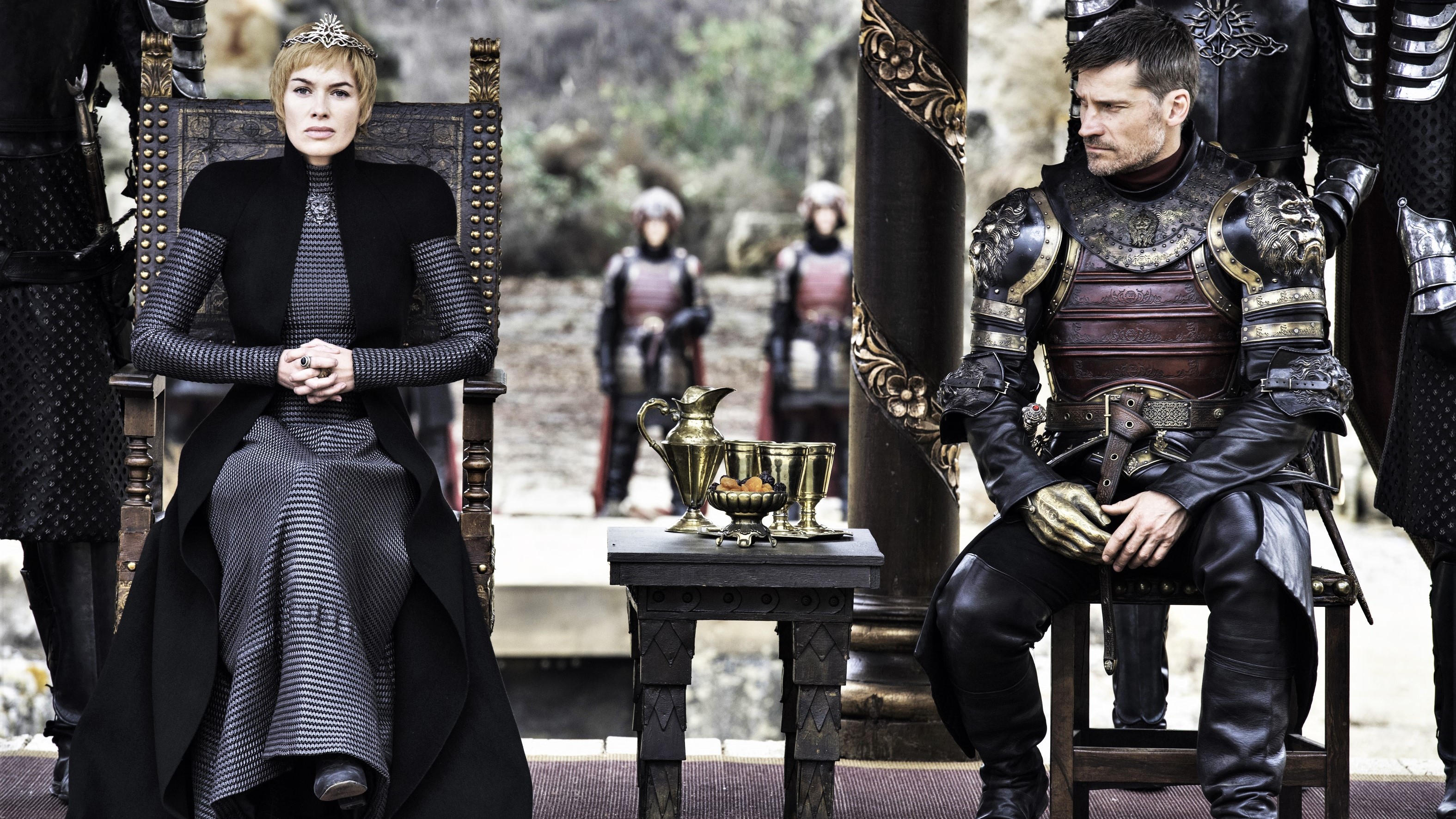
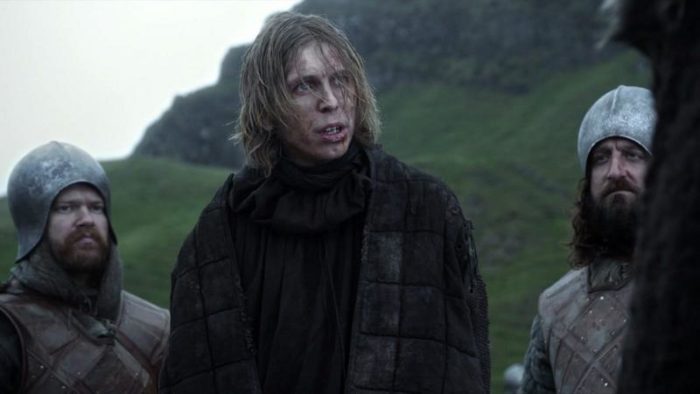
No comments:
Post a Comment